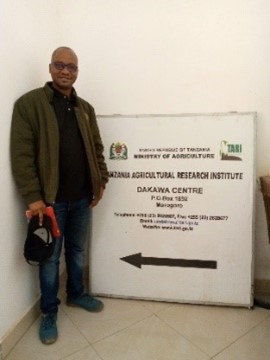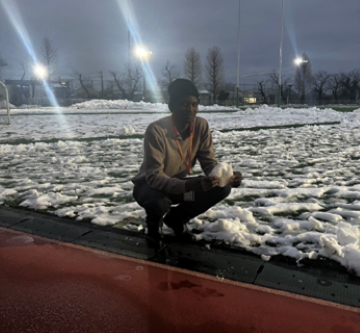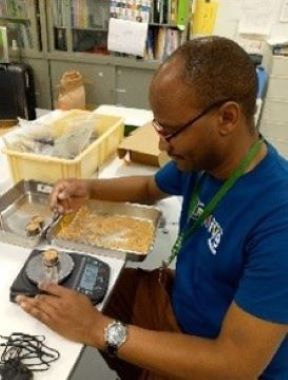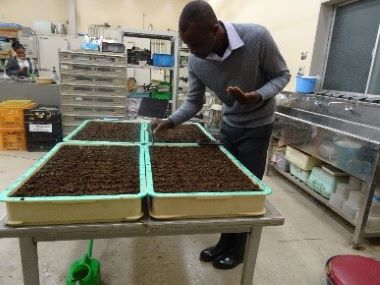JICAインターン生が取材しました!長期研修員の魅力⑦
2024.12.19
長期研修課では、2024年JICAインターシップ・プログラムに参加している日本の大学・大学院生を受け入れています。インターン生6人による開発途上国から来日している留学生へのインタビューを順次お届けします。
喜多羅理絵(早稲田大学 政治経済学部 国際政治経済学科 2年)

JICA食料安全保障のための農学ネットワーク(Agri-net)を通じ、東京農業大学で修士号を取得した仲良しのMacha Jimmy FelixさんとPhiri Mabvutoさん(以下、マチャさんとフィリさん)にインタビューし、日本で過ごした経験についてお聞きしました!
マチャさん
タンザニア連合共和国ダルエスサラーム市出身、東京農業大学大学院・生産環境工学科を卒業後、タンザニア農業省に復職します。

マチャさん/ Mr. Macha
フィリさん
ザンビア共和国北部出身、東京農業大学大学院・国際農業開発学科を終えた後、ザンビア農業研究所(ZARI)に復職します。

フィリさん/ Mr. Phiri
マチャさん
私は農業省で灌漑・機械化部門で働いており、同部門では、灌漑施設の設計、建設、管理に重点を置いています。私の研究している地域の灌漑スキームの生産性は、プロジェクトが行われているにもかかわらず、非常に低いのです。そのため、Agri-Netの枠組みで日本の大学に留学し、さまざまな技術や知識を得ることで、留学後、母国に戻り、農業省や灌漑部門に役立つ出来得る限りのことを実施したいです。
フィリさん
私はZARIに入る前、農作物の購入や農民への生産技術の指導を主に行うNGOで働いていました。そこでのエリアマネージャーという仕事を通じて、私は稲作に関する知識や活動を学びました。ZARIでコメを担当するチームに配属されたことをきっかけに、もっとコメや、ザンビアにおける稲作の課題について実情、解決策を知りたいと思い応募しました。
マチャさん
特定の地域の生産性が低い理由は、透水性がよくないことだとわかり、土壌の質の問題を把握した後、行政や農家などが行うべき作業計画を策定しました。
その際、指導教員に用意していただいたスケジュール通りに進めたことが功を奏しました。また、研究室に英語が喋れる方が多く、うまく協力しあいながら研究生活を送れました。

研究室で実験中/ Experiments at NODAI Research Lab
フィリさん
ザンビアではコメの国内生産量が消費量を満たさないため、生産レベルを改善する必要があります。私は、稲の種子のプライミングと根の浸種が出穂と定着に及ぼす影響、言い換えれば農学の知識を利用して、稲の生産性をどのように変化させ、向上させるかについて研究しました。研究室での言語の壁などありましたが、この2年間で、いろんな困難も乗り越えることが出来ました。

研究室で実験中/ Experiments at NODAI Research Lab
マチャさん
卒業後は、農業省での仕事に復帰します。タンザニアでは灌漑プロジェクトを立ち上げる際、土壌調査をしないまま、プロジェクトを実施しています。そのため、政策立案の際、土壌評価を行うことを義務付けしていきたいです。また、農民の方々に向けた、土壌の質や透水性の改善法に関するデモンストレーションも行いたいです。
Agri-Netやその他のJICAの留学プログラムへの応募をお勧めします。JICAの留学プログラムを通して、様々な課題に対処する精神力が養われ、それを自国の開発に生かすことができます。
フィリさん
卒業後、私はZARIで働き続けます。私のパッションは技術開発であり、学んだことを実践し、生産性を向上させるためにもっと努力したいです。それを小規模農家に提供し、貧困や飢餓と闘いたいです。
(Agri-Netを含む)留学プログラムに応募し、より多くの知識を得て、自国を発展することを奨励します。JICAのプログラムや大学で学ぶ新しい知識は、農業だけでなく、様々な分野でより多くのことを考え、変化する原動力となります。
インタビューを通して、マチャさんとフィリさん個人の研究の原動力と自国の農業発展に貢献したいというパッションを知ることができました。また、二人の仲良しストーリーも聞けて、自国に帰っても連絡しあい、会うそうです!
I interviewed Mr. Jimmy Felix Macha and Mr. Mabvuto Phiri who recently obtained their Masters degree from Tokyo University of Agriculture through Agriculture Studies Networks for Food Security (Agri-Net) program, about their experience in Japan!
Mr. Macha
I worked for the Ministry of Agriculture in the Irrigation and Mechanization Department, focusing on the design, construction and management of irrigation facilities. The productivity of irrigation schemes in the area I am studying is very low, regardless of the project being undertaken. By joining Agri-Net and gaining various skills and knowledge, I can return to my home country and implement everything that will help the Ministry of Agriculture and the irrigation sector.
Mr. Phiri
Before joining Zambia Agricultural Research Institute (ZARI), I worked for an NGO that focused on purchasing crops and teaching improved production technologies to farmers. I was assigned to the rice team at ZARI, and I wanted to learn more about rice and the challenges of rice cultivation in Zambia, and how to solve them, which is why I applied to Agri-Net.
Mr. Macha
In simple words, I found that the reason for low productivity in certain areas was poor permeability, so after identifying the soil quality problem, I planned the work to be done by the government, farmers, and others.
I followed the schedule prepared by my advisor, which was very successful. We also had many English speakers in our lab, and we worked well together.
Mr. Phiri
In Zambia, domestic production of rice does not meet the levels of consumption, so production levels must be improved. Thus, I have been researching on the effects of seed priming and root dipping of rice on emergence and establishment, in other words, how to use agronomy to change and improve rice productivity.
There were obstacles along the way such as the language barriers in the lab, but I overcame various difficulties over the past two years.
Mr. Macha
I will continue working for the Ministry of Agriculture after graduation. In Tanzania, when we start irrigation projects, we introduce projects without conducting soil surveys. So, we will make it mandatory to conduct soil assessment when formulating policies. We will also provide demonstrations to farmers on how to improve soil quality and permeability.
I encourage you to apply for Agri-Net and other programs. Through the program, you develop the mentality to deal with various challenges, which are crucial for the development of your country.
Mr. Phiri
I will continue to work for ZARI. My passion is with technology development, I want to do more to implement what I have learnt and improve rice productivity for the small farmers to fight poverty and hunger in the country.
I encourage them to apply, gain more skills and knowledge to develop their countries. This is because the new knowledge they learn at JICA and at the university will drive them to have critical thinking abilities, not only in agriculture, but in many other areas that need development.
Through the interview, I was able to learn about Mr. Macha and Mr. Phiri's personal drive for research and passion to contribute to the development of agriculture in their own countries. I greatly enjoyed listening to the close relationship they cultivated during their time in Tokyo, and their intent to stay in touch when they are back in their respective countries!
◆関連リンク…
・JICAインターン生が取材しました!長期研修員の魅力④ | 日本国内での取り組み - JICA
・JICA開発大学院連携/JICAチェア | 事業について - JICA
・研修員受入事業(長期) | 日本国内での取り組み - JICA
scroll